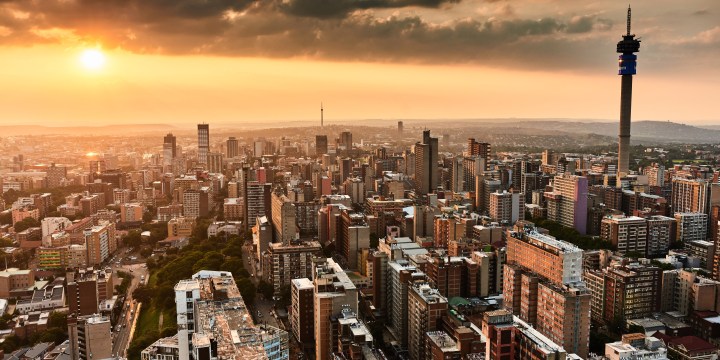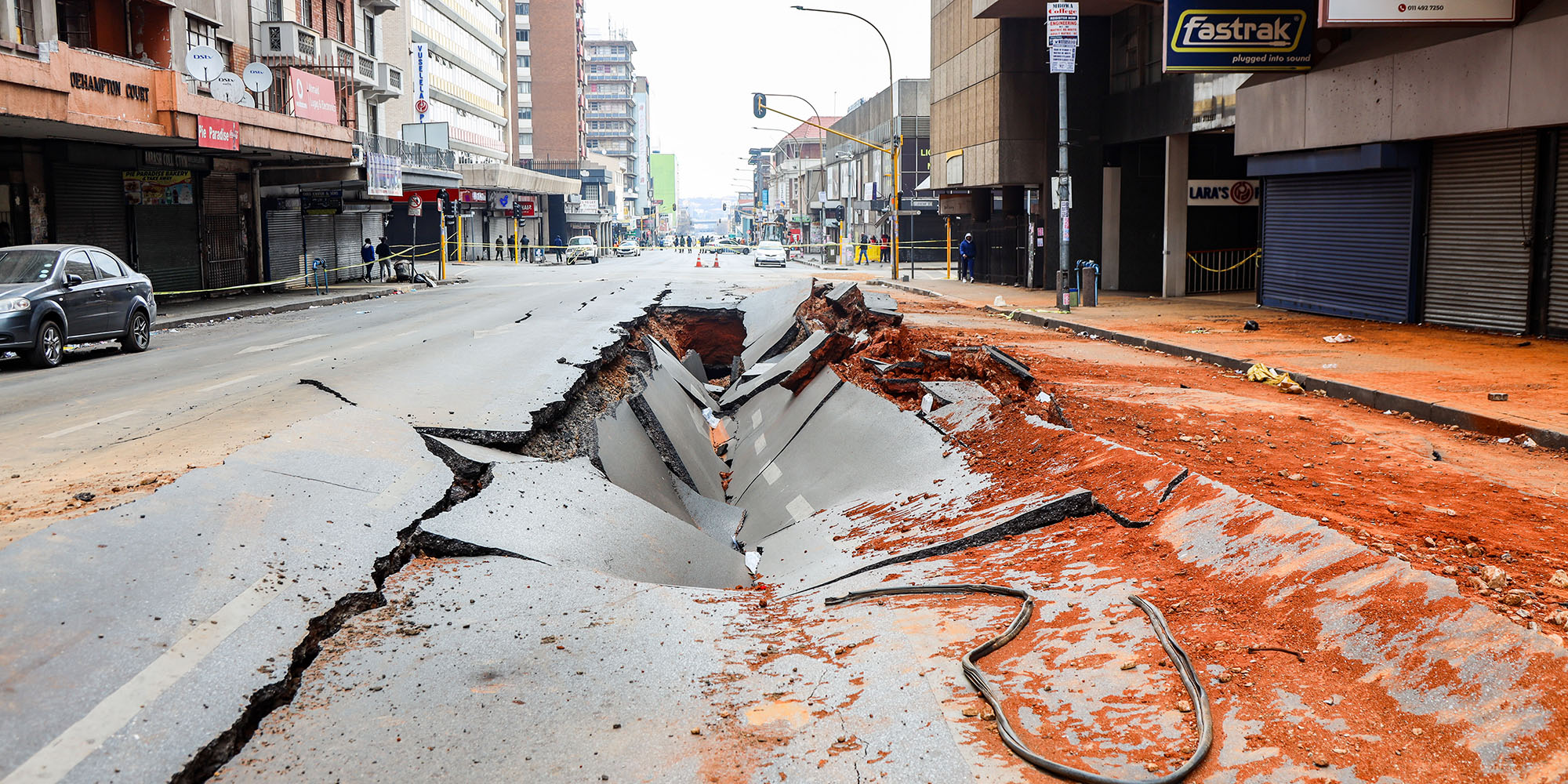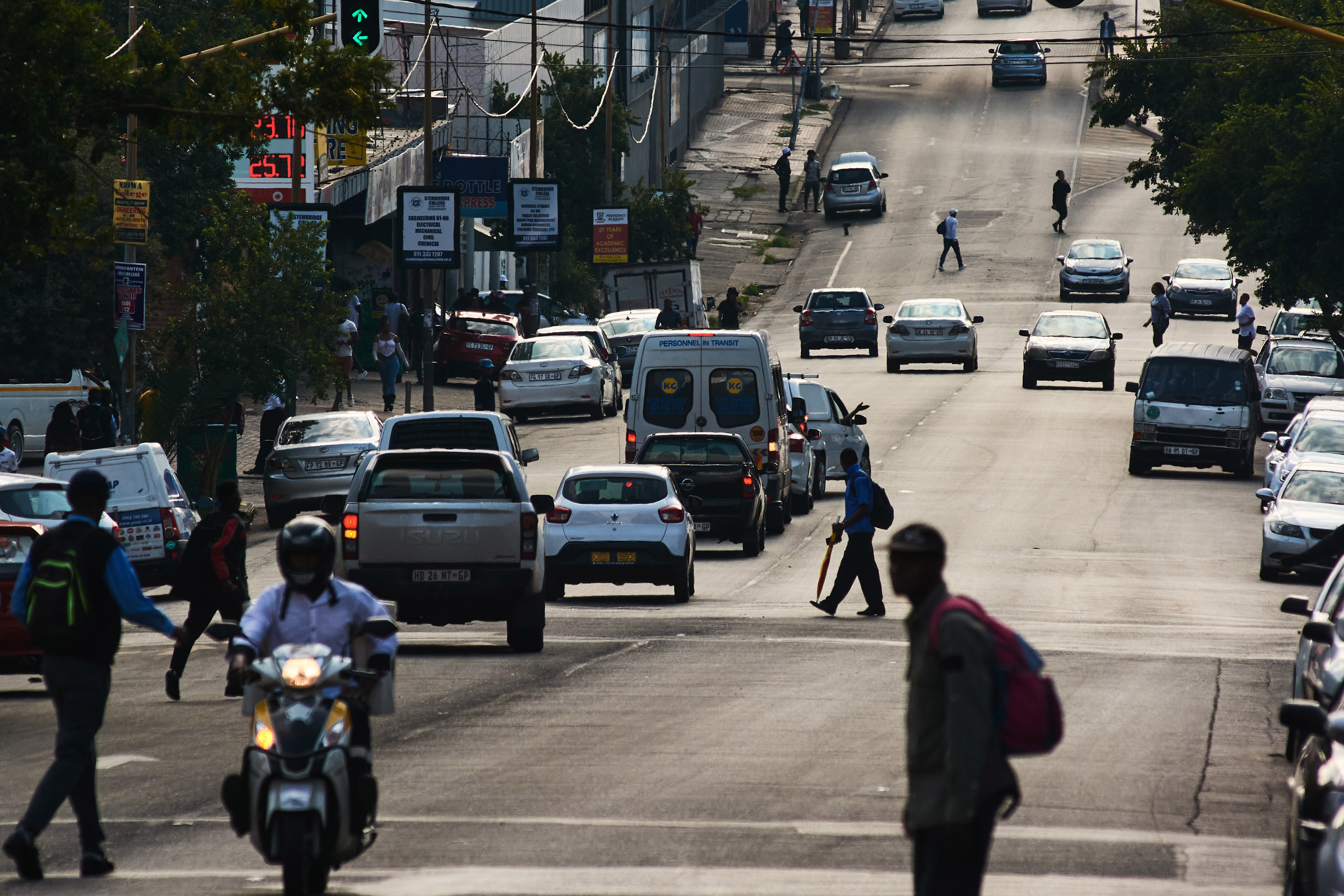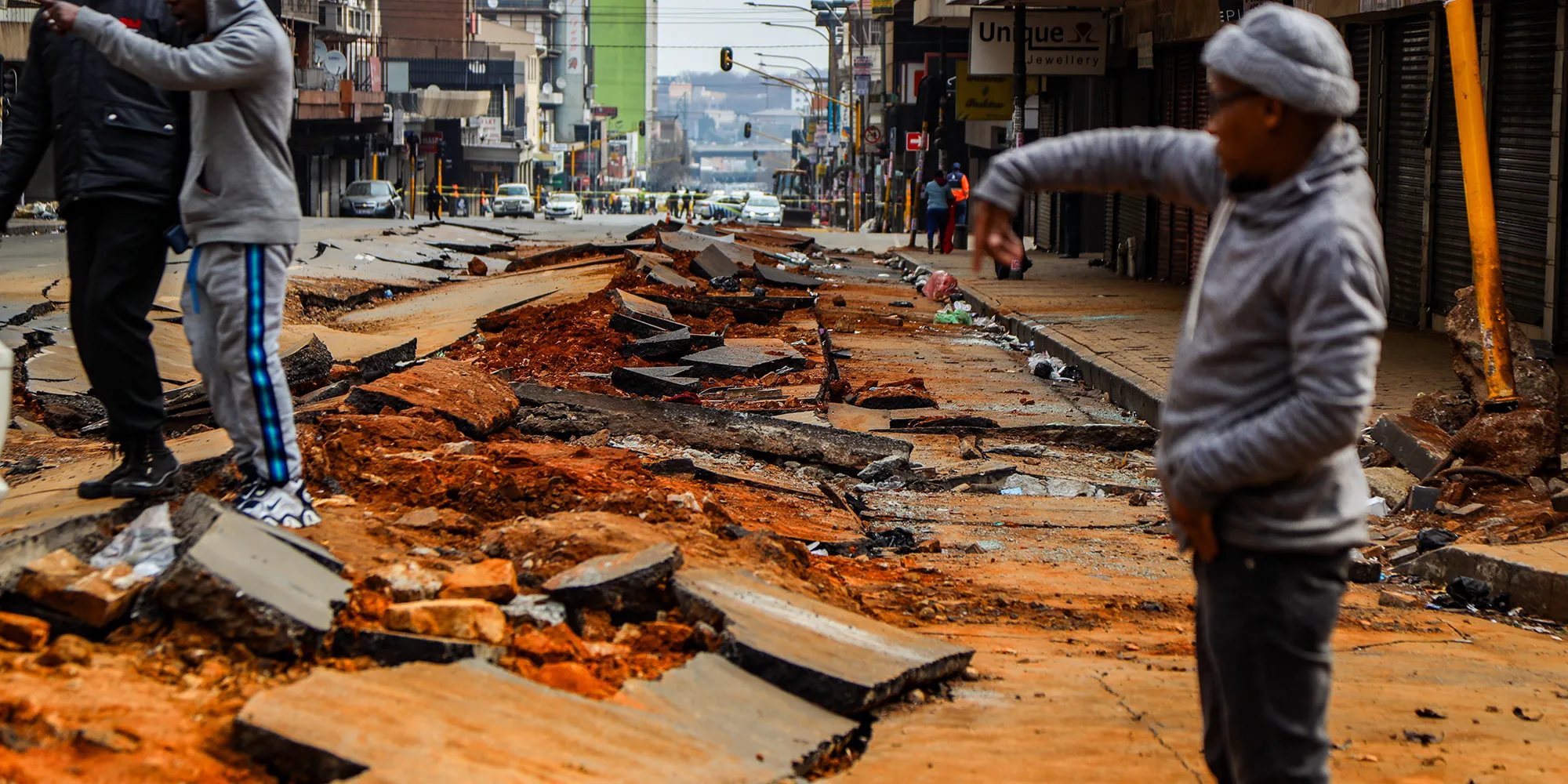TUESDAY EDITORIAL
How to fix a dump site? Johannesburg Crisis Forum says ‘Take back Egoli: Reclaim the City’

The problem with the citizens of greater Johannesburg is not apathy or resignation. It is that from one community to another people are not aware of what the other is doing. The citizenry are not combining their power or their solutions into a movement that is more than the sum of its parts. There is a need for urgency, action, coordination and imagination. Activism is not whinging, it’s doing.
If you take a walk at the Northcliff Ridge Ecopark, Johannesburg’s highest point, you can have a 360-degree view of the city. Before you is the cityscape, below you the suburbs, engulfed in what is said to be “the largest man-made urban forest in the world”. To the north are the Magaliesberg mountains, to the south the mine dumps that border Soweto.
Johannesburg is unique in that the same space can hold polar opposites that are equally true: the cradle of humankind is also a cradle of human cruelty; the gushing white waters that gave their name to the Witwatersrand now run in rivers that are among the most polluted in the world.
Despite and because of all of this, when you wander Johannesburg’s streets and suburbs, explore its many heritage sites, you cannot but be inspired by the reality that it’s still a city packed with great history, beauty, wonder… and possibility.
A city still worth fighting for.
Predictably, last week’s explosion on Lilian Ngoyi (Bree Street) has once again led to an avalanche of words on the state of Johannesburg; from dream of a “world-class African city” to reality a world-class African dump site.
The ‘long tail’ of Johannesburg’s infrastructural implosion is described by Ferial Haffajee here: Johannesburg’s emergency call for engineers, gas-detection experts after CBD explosion exposes dire skills gap

Lillian Ngoyi Street in Johannesburg on 20 July 2023. (Photo: Gallo Images / OJ Koloti)
The angst is understandable. People need to vent. But on their own, words will fix fokol.
Neither will making more demands on the current crop of crooks masquerading as elected politicians; and remember, even if a successful civic mobilisation brings dramatic changes in 2024 after elections at national and provincial level, the next local government elections are still three years away.
So, what is to be done?
Several weeks ago the Ahmed Kathrada Foundation (AKF) convened a Johannesburg Crisis Forum. A racially and socioeconomically diverse group of people, numbering more than 75, attended. They came from deprived informal settlements and townships to posh suburbs. Predictably the meeting started with a long catalogue of heartfelt complaints.
This followed a presentation of some startling statistics that gave participants a sense of the deep structural crisis in the governance of the city.
Basically, Johannesburg is bankrupt.

People walk along a damaged street following an underground explosion, in Bree Street, downtown Johannesburg, South Africa, 21 July 2023. An underground explosion on 19 July killed 1 person and injured at least 48 people. (Photo: EPA-EFE/KIM LUDBROOK)
According to data drawn from audited reports and presented by Rashid Seedat, the executive director of the Gauteng City-Region Observatory:
- It costs R4.3-billion per month “to keep the city afloat”;
- Yet its 2022/23 budget was “rebased” (a euphemism for cut) by R6.8-billion;
- Making this worse, the billing for services was R3.4-billion below budget, yet its collection on billing in 2022 was only 75%, against a Treasury norm for revenue collection of 95%;
- Is it surprising then that financial institutions are “reluctant to lend to the city”?
As usual, the usual suspects for this crisis are hiding in plain sight. The meeting was told:
- The cumulative balance for unauthorised, irregular, fruitless and wasteful expenditure is R21-billion;
- Billions of rands are being lost as a result of ageing water and electricity infrastructure and a lack of maintenance;
- Corruption costs billions, and is mostly taking place with impunity; and
- Those who challenge it are fired, most recently Sarika Lakraj-Naidoo, former finance director of the Department of Public Safety who raised red flags to the tune of R8.2-billion within her department.
Read more in the Daily Maverick: The great Covid-19 swindle (Part Three): Johannesburg City Council – ‘It’s a free-for-all’
Johannesburg is not a going concern. Yet millions of people live in it and millions depend on it.
So what, I ask again, is to be done?

The Johannesburg CBD on 22 December 2022. Activists have demonstrated that it is possible to rebuild social infrastructure and cohesion at a local level. (Photo: Waldo Swiegers / Bloomberg via Getty Images)

Residents stand along the road that collapsed following an explosion in Johannesburg’s CBD on 20 July 2023. (Photo: Gallo Images / OJ Koloti)
Activism will set us free
The advantage this journalist has is a bird’s-eye view of activism, combined with a good nose for activists. Together, the two tell me that in every suburb of Johannesburg, citizens can be found who are organising to fix issues: whether it be parks, sports, crime, conservation, sanitation, access to food, education, river pollution. Look (not very hard) and you will see something happening.
The most successful of these activities are usually distinguished by their inclusivity, overcoming spatial and spiritual apartheid, bringing together poor with middle class, homeless with homeful, South Africans with migrants.
They are big ideas playing out in small corners.
Recently Daily Maverick has been writing about them extensively. A few samples below:
‘Fire and magic’: a Joburg inner-city haven of hope and basketball
Community changemakers desperately need support to uplift Joburg’s impoverished urban dwellers
Crumbling Yeoville — the inner-city Joburg neighbourhood that the government seemingly forgot
The problem therefore is not apathy or resignation. It is that from one suburb or township to another people are not aware of what the other is doing. The citizenry are not combining their power or their solutions into a movement that is more than the sum of its parts.
Another problem is that the fixes people are working for locally are not tied to a larger people’s plan for the city, a blueprint and set of values that will allow us to reclaim our city from below: “A vision for the city, drafted by the people for the people,” as one group defined it at the AKF meeting.
As always there are naysayers.
A few people still argue that “we shouldn’t do the government’s job for them.” True. But if truth also be told, unless we fix our suburbs they won’t be fixed.
Unless we clean up our streets, restore dignity to our surroundings, rebuild empathy and compassion between all classes, colours and nationalities that inhabit these spaces, it won’t happen.
On the other hand, activists have demonstrated that it is possible to rebuild social infrastructure and cohesion at a local level. And quickly see a difference.
For example, this weekend, DM168 published a story about gatvol people doing it for themselves in Durban. On the Verge, an organisation formed by two small business people in Morningside, Durban, because they felt “on the verge of despair”, is cleaning up pavements, tidying parks and public spaces, planting flowers, painting murals and edging walkways in their suburb.
“It’s a joy,” they say. “The community has grown closer. We’ve got to know one another better. More people are having conversations and I think we see a more fulsome picture of society. It is not all gloom. A bit of hope is catchy.”
So, what is to be done?
The AKF-convened Johannesburg Crisis Forum came up with many good ideas, including:
- A peaceful protest march of all communities in the city;
- Establishing “citizen auditors”;
- Establishing a city-wide network that will agree on working principles, accountability measures and mechanisms;
- Having a “Fridays for future”, replicating the climate strikes popularised by Greta Thunberg, but focusing on local issues such as water and energy solutions; and
- Monitoring the city’s budget and corruption so that, for example, unspent conditional capital grants totalling R768-million get spent!
But there is a need for urgency, action, coordination and imagination. Activism is not whinging, it’s doing.
The focus now must turn to fixing and finding solutions, and as we fix, building values-based political communities. As we fix, we will soon work out which local government officials and councillors are worth their salt. As we fix, we will incrementally build people’s power so that come the 2026 local government elections the foundations will have been laid to elect a local government that will diligently serve the people of Johannesburg. We won’t be fooled again. DM
In 2011, several NGOs published Making Local Government Work: An Activist’s Guide. Although a little out of date, for those concerned with fixing Johannesburg and other municipalities it’s still a valuable guide to the law and rights concerning local government.





















 Become an Insider
Become an Insider
Dear Mark
How could I help. I’m sure there are 10s of thousands of retirees all over who have time, energy and skills who would be willing to contribute some of these activities if there was an organizing group.
Anybody other readers interested in helping in your area
?
I also want to know how I can help… I think there are a lot of us who want to but don’t know where to start.
Thank you! We need more people like you!
Go to outa website, look at initiatives CAN (Community Action Network)
AKF should add performance contracts to the sad politicians of Jhb. You get below a 3 and so haven’t met your target and get dismissed. The politicians will form a National Union of Cadre Deployments and Hopeless Politicians to fight the scourge of active civil society.
Agreed!
Extract from the article: ‘So what, I ask again, is to be done’?
Mark – the problems of JHB are not unique to just JHB. Many large cities around the world have similar problems – especially around bankruptcy, plus maintaining and upgrading infrastructure at a pace that satisfies urbanization. EG: Thames Water is London has a 14 billion Pound debt (~R 312 Billion). All water boards in the UK have a combined ~60 billion Pound debt (~R1.4 Trillion). It is probable that cities have just grown too large and too fast to manage and run financially as a single entity. Perhaps JHB should be broken into manageable entities – whether this is done geographically or by resources/finances will need to be considered. The concept of school twinning is known whereby a wealthy school assists a less advantaged school. Maybe this concept could work by suburbs – they don’t necessarily have to be next to each other. Public committees could be established to provide oversight on the symbiotic management model. Best this be by professional people and the politicians be kept away. The problem in SA, from small towns to large cities, is that politicians have far too much say and sway. They should have little final decision making role, but perform their duties to merely convey the feelings and thinking of their electorates to the professional managers that should be running the city. The ultimate decisions must come from the qualified accountants, engineers, scientists and department managers.
Mark,
Nothing is possible and likely to succeed until the ANC and all the cadres and deployees are distanced from every lever of influence and power. This should not be dependent on waiting for the whims of voters, rather they need all to be arrested, charged and locked up.
The proposed action steps could start mobilizing people. There have also been similar networking meetings with Residents associations and OUTA recently to work towards restoring our city of Joburg. The question is whether there are enough people willing to step up to work towards change.
OUTA have set up an umbrella body to assist Ratepayers Association to address issues with COJ on behalf of residents. go to outa website and look under initiatives for CAN Community Action Network.
Just look at what local people are doing in the Greater Ethekwini Area! To mention a few:
Urban conservancies like
Everton, Gillitts , Hilcrest and Kloof are, amongst other efforts, developing and managing trails in natural areas for all people to enjoy, eradicating alien invasive plants in grasslands and riverine forest, getting involved with combatting sewage pollution in the Molweni river due to mismanagement and pollution by local businesses, managing parks, the list is very long!
Keep Kloof beautiful project.
Keep Hilcrest beautiful project.
Ciitizens have to take ownership of their respective communities and become more involved in making their neighbourhoods better places for everyone. Added to the political corruption and incompetence that abounds its is apathy and the constant whinging by the chattering classes that leads to broken cities.